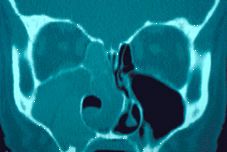Sinusitis

IMPORTANT The information provided is of a general nature and should not be used as a substitute for professional advice. If you think you may suffer from an allergic or other disease that requires attention, you should discuss it with your family doctor. The content of the information articles and all illustrations on this website remains the intellectual property of Dr Raymond Mullins and cannot be reproduced without written permission.
Summary
The sinuses are cavities within the skull. They drain into the nose through small holes. If these become blocked, an environment is created that favours the overgrowth of bacteria resulting in sinusitis. Hay fever, having nasal polyps, being a smoker and having young children or working in childcare are common reasons for having recurrent infection.
What are sinuses?
The sinuses are cavities within the skull. They are present in the forehead cheeks and between and behind the eyes. They are connected to the nose through small tunnels that are little wider than a pinhead. Blockage of these tunnels (due to allergy, colds or polyps) often causes pain in the face. A blocked sinus cavity creates an environment that favours the overgrowth of bacteria, just like slime grows in stagnant water.
How common are sinus infections?
Sinus infections often follow simple colds. Most viral infections ("colds") last less than a week. Longer-lasting symptoms often indicate nasal allergy or the development of a sinus infection.
What are the symptoms of sinus infection?
-
•green / yellow mucus coming from the nose or down the back of the throat
-
•bad breath
-
•bad taste in the mouth
-
•sore throat
-
•losing the sense of smell or taste
-
•cough
-
•tiredness
-
•temperature or shivers
-
•sore upper teeth
-
•facial pain
-
•sensation of pressure that is worse with leaning forward.
Why do people get sinus infections?
The most common predisposing factors include untreated allergy, twisted nasal anatomy, the overuse of decongestant nose sprays from the chemist and exposure to young children, who always seem to have a cold! Nasal polyps and smoking can predispose to infection. Diet plays no role in causing or preventing infection. A weak immune system is a very rare cause, especially if sinus infection is the only major problem.
How are sinus infections treated?
Early treatment with steam inhalations or salt water nose sprays will often help the infection to go away without needing to resort to antibiotics. When antibiotics are needed, the entire course must be completed. Encouraging people to stop smoking and treating predisposing factors like allergy may reduce the risk of infection. Surgery is sometimes needed when medication does not help.
Last reviewed 5 April 2020
